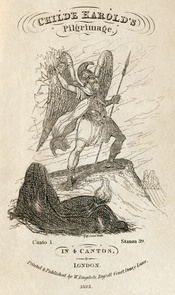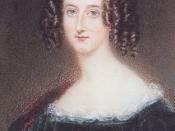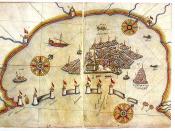"Venice once was dear, the pleasant place of all festivity, the revel of the earth, the masque of Italy." Lord Byron describes Venice as a place of great revelry with carnival, masquerades, and opera. This is a common stereotype of early modern Venice. However, the experience of hundreds of patrician women involved more sacrifice than festivity. The writings of Arcangela Tarabotti were created in seventeenth century Venice. Venice at that time was a place of great contradiction. The republic proclaimed the great political and social liberties that its citizens enjoyed. However, as political freedoms were being developed the women of Venice were dealing with great inequality. Influences from Greek, Roman, Hebrew and Christian sources gave evidence for the complete subordination of women in the seventeenth century. These traditions were adapted into the intellectual, legal, religious and social structures of the republic. This led to the religious imprisonment of hundreds of women into convents across the city.
What was the experience of a woman in this society? Paternal Tyranny is a great source of information to help capture the personal consequences of the restrictions placed on women. This paper will show that the feminine experience in Venice was shaped primarily by increasing social pressures placed on the patriciate and continued because of the restrictive access to education.
The nobility of Venice was extremely protective of their status. Around 1400 the patriciate consciously created restrictions that would widen the gap between the nobles and the populace. There was a major emphasis placed on restrictions preventing interclass marriage alliances. Stanely Chojnacki writes that by the sixteenth century these laws were leading to the practice of restrictive marriages. Families were limiting the marriages in sibling groups in order to protect familial wealth from being divided. These laws had dire effects on young patrician women.
The laws resulted in dowry inflation which made it impossible for families to marry their daughters to earthly husbands. Many families discouraged their children from marriage to prevent the fragmentation of the patrimony which would ensue from the proliferation of heirs. This affected all young patricians. However, men had a broader range of options available to them. They had career opportunities including military, political, professional, and commercial endeavours which could ensure their freedom. Their sisters on the other hand had extremely limited lifestyle options. They were either permitted to marry a patrician of equal standing or they were often forced into the convent.
The nobility believed strongly in these restrictions even though they were forcing women into vows for which they had no calling. By the late sixteenth century even the archbishop of Venice recognized that the practice of coerced monacation had grown outrageous. He claimed that the 2000 noble female religious were being stored in convents "as though in a public warehouse." But his voice of opposition was lost in the crowd of supporters. Supporters like Pietro Loredan who was a founding member of the otherwise progressive Accademia delgi Icognoti. He wrote to a young niece, who was looking for support from her liberal uncle, that her social status was more important than her liberty. As a woman without a dowry to meet her social standing she only had unacceptable marriage options. A marriage below her rank would bring "universal contempt," from others in the nobility for the "stain of an inferior alliance." Her only option was to give up hope of freedom and to enter the convent.
As a result of social pressures large sections of noble women were deemed unmarriageable and thus absorbed by the cities convents. The numbers outlined by Jutta Gisela Sperling are quite dramatic: in 1581 nearly 54 percent of patrician women were nuns, and by 1642, 82 percent may have been vowed to convent life.
The experience and opinions outlined in Arcangela Tarabotti's Paternal Tyranny give historians a rare look at the experience of women in this society. It gives proof that many of the nuns resented the culture and the families that imprisoned them. By the mid-sixteenth century an anonymous Bolognese writer described these women as being, "forced by their fathers and brothers into convents with meagre allowances, not to pray and bestow blessings, but to blaspheme and curse the bodies and souls of their parents and relatives, and to indict God for letting them be born."Arcangela is a perfect personification of the previous description. She was sent at eleven years old to the Benedictine Convent of Sant' Anna. In 1623 at the age of eighteen she took her final vows of chastity, poverty, obedience and stability. It seems that she was never fully committed to her religious promise. She refused to wear the religious habit or to cut her hair. In her writings she echoes the words of both the Archbishop and the Bolognese writer. She explains that the convent was for many a place of illegitimate religious contemplation. In fact, she claims that it was nothing but a dumping ground for the patrician families of Venice. It was a prison for the "unfit, unwanted and illegitimate" daughters of the patriarchy.
The primacy of the father in Venetian families was inherited from Roman traditions. The elaboration of traditional laws which resulted in the Corpus of Civil Law helped to shape women's experience for centuries to come. The paterfamilias was an important concept that was adapted into Venetian society. The head of the household owned all of the family's property including its human members. His absolute power could shape the lives of his wife and children.
This inherited subordination allowed for the manipulation of hundreds of young patrician women into the convent. They were subject mainly to the decisions of their father's. When societal pressures increased and the nobility became obsessed with maintaining their status the lives of the children were sacrificed for the good of the patriciate.
The heads of the Venetian families used many methods to convince their young daughters that the religious life was their destiny. Tarabotti describes blackmail as a major proponent for the increase of female religious. This would suggest that social pressures were forcing parents to choose their nobility over the good of their children. Thus, the pressure on young women to sacrifice themselves for the maintenance of the nobility was immense. Fathers insisted that the convents were built specifically for the well being of these young unfortunate girls. Many blamed the financial stability of the family and used guilt to convince their young daughters to give up there freedom. Laws suggested that it was necessary for daughters to be shut away in the service of God to ensure the survival of the family's social status. The use of God's will and familial guilt infuriated Tarabotti. She believed that fathers were taking advantage of the ignorance of young women and a misuse of paternal power.
Who were the unmarriageable daughters of the republic? It seems that not only financial factors led to the incarceration of young women. The nobility were afraid of the stain of inferior marriage alliances and also the stain of human imperfection. The addition of a physical impairment or an illegitimate birth heightened the chances of the religious institutionalization of a young woman. Tarabotti observes her convent surroundings as a hiding place for the most "contemptible members," that the society possessed. Through the wickedness of "greedy fathers," women with any sort of impairment were locked away behind the convent walls. Arcangela was born lamed and she recognized this as one of the reasons for her place in the convent. The "deformed, lame, hunchbacked, crippled, and simpleminded," were offered up by the society as suitable brides for Christ. These women were blamed for their natural defects as well as their femininity. Thus, they were condemned to lifelong imprisonment. Fathers informed their daughters that their deformities made them unfit for membership in the married nobility and thus they were advised to "lock themselves in a cage." The pressures of nobility were extremely important in the experience of Venetian patrician women.
Though there were hundreds of women forced into religious life few spoke up against the injustice. Tarabotti is a very rare glimpse at the real feelings of these young women. They were kept silent because of three major reasons. Firstly, and most importantly women were seldom given enough education to enable them to write. Second, the stories and knowledge that they possessed were rarely deemed worth reading or writing by the literate public. Finally, the culture believed that silence was a positive characteristic for women. To express opinions openly was to act unchastely. These conditions and the subordinate place of Venetian women made it remarkable that any important writing emerged from behind the convent walls.
The imposition of silence was recommended in the Christian Epistles. Women were told from the pulpit to learn in "silence and with all submissiveness." However, according to Arcangela even the submissive learning recommended by St. Paul was not given to the women of her society. She insists that this lack of education was one of the main reasons for the continuance of the paternal tyranny of her day. Women were kept submissive and were easily ushered into the convent because they were ignorant and thus easily manipulated.
The ignorance of Venetian women should not be blamed on them. There were long lasting traditions that ensured that women were kept at an arm's length from learning.
Greek philosophy proclaimed that women were inferior to men. Women were seen as useful only as child bearers and housekeepers. Aristotle expanded the inequality of women in his Generation of Animals. The world existed in dualities of which male and female were important opposites. He recognized the superiority of action over inaction, form over matter, completion over incompletion, and finally possession over deprivation. In these dualities the male was associated with the superior and the female joined with the inferior. This Greek concept became important in European thought. Women were seen as unworthy and incapable of higher learning. They were seldom permitted to study the important disciplines of grammar, rhetoric, logic, philosophy, theology, or other sciences. It was seen as a threat to their chastity for women to attend the schools which taught such subjects.
This concept was completely rejected by Tarabotti in Paternal Tyranny. She recognized that she and the women around her were often ignorant. They were in fact subordinate in knowledge to their male counterparts. However, this was not due to a natural or inherent characteristic in the female sex. It was due to societal factors that caused women to remain intellectually insufficient. Tarabotti accused the patriarchy of Venice for deliberately keeping sufficient education from women in an attempt to maintain the gendered traditions of the culture.
It is likely that the men of Venice were not consciously keeping their women ignorant. However, the observations about the female intellect were correct. It was a mistake for Venetian society to compare the intellect of men and women on an equal level. Women were seldom given equal opportunities. Thus they were "wondrously stripped," of learning. Therefore through societal deficiencies women were deemed ignorant and imperfect. Women were accused of 'worldly vanities and sensualities', characteristics that could be controlled in the convent. According to Tarabotti it was due to their ignorance that women were not able to or did not wish to change their ways. Furthermore, women were not able to defend against such accusations because they were not given the intellectual means to do so. Their subordination continued as a result of their inability to fight it.
A woman in Venice lived in lifelong subordination to others. She was constantly under the power of her father or her husband. Young women were told that the Church offered an alternative to this. It was often portrayed as a career path which would allow greater independence than was available in the secular world. It seems that education opportunities were offered up as incentives for the religious life. For women like Tarabotti this seemed like an extremely positive characteristic. The education that the convent promised was much greater than that offered outside its walls. It seems that Tarabotti and likely many others were deceived. The convent may have offered a slightly more advanced education than was available to women in the general public but their imprisonment diminished any of those advantages. Tarabotti described her vocation as a prison rather than a career path or school. This deception shows that women were desperate to obtain advanced education and that the society was willing to exploit this to maintain the prestige of the nobility.
Tarabotti was a rare voice from within the convent compounds and yet she also suffered from intellectual deficiencies. This seems to have angered her most of all. She was given teachers who could "barely instruct them in the rudiments of read." Female religious were seldom offered lessons in philosophy, law or theology. These were disciplines that would have been extremely helpful in their fight against the patriarchal system. Men used biblical passages, ancient Greek philosophy, and Roman law traditions to solidify their superiority. Their sisters were never given the learning or the chance to respond. They were taught nothing more than the, "ABC's and even this was often poorly taught."In her later writing, Convent Life as Paradise, Tarabotti offers up her literary works as examples of female intellectual deficiency. She was able to overcome her lowly education to write against her society. She criticizes her own writing for her lack of higher education. She blames it exclusively for her lack of, "fine vocabulary, elegant tropes, and pleasing descriptions." In the place of rhetoric and philosophical evidence Tarabotti has sheer emotion. Her works are full of an honest and compelling plea for societal change. She was able to overcome the deficiencies that kept many of her contemporaries silent. She is an example of the potential feminist struggle that could have occurred were women given a learned chance to fight the patriarchy.
Women should not have been blamed for any lack of intelligence that they possessed. They were denied access to books and teachers of any learning. Thus foolish decisions that men blamed them for should have been blamed on society not on femininity. The patriarchy often pointed to Hebrew texts for evidence of the imperfection of femininity.
The second creation story explains that Eve was created from the rib of Adam. This was a major basis for Christian theologian's understandings of gender. They saw that Eve's creation from Adam as a reason for her subordination.
Further, the temptation story of Genesis 3 along with the previously mentioned creation story gave theologians a great deal of evidence for their gender ideas. The serpent's temptation of Eve and her subsequent deception of Adam places all the blame on the female character. Eve became responsible for the fall of man. The women of Venice were not only given familial guilt in an attempt to maintain the patriciate but they were also blamed for original sin.
This claim may have been refuted if women were given the intellectual opportunities to study scripture. Tarabotti points to the creation story as a proof of her feminist beliefs. She reveals that the temptation of Eve shows that she was not subordinate to Adam. If Adam was given power and superiority over Eve then she would not have been given the free will to commit sin. She would not have been able to make the decision without the consent of her husband. This scripture was for years interpreted by men as a proof of their superiority. In the hands of a woman it was proof of her equity. This shows that one of the main reasons for the continuance of paternal tyranny was the absence of female learning.
Further, Eve was an example of a woman's thirst for knowledge. She accepted the evil offered by the serpent in a search for knowledge. Venetian women in turn accepted the evil of forced imprisonment for a chance at learning. Thus women were not incapable of valuing wisdom as the "brutes" of the seventeenth century believed. Though they were kept from education they were spurred on in a search for knowledge.
The writings of Arcangela Tarabotti are an important window into the lives of a large section of Venetian society. The sad plight of many of these women has been lost. Arcangela gives them a voice. She was articulate, insightful, and blatantly honest about her social observations. She seems to have had little fear of backlash and blames her family, her society and her church as, "brutes," and "heinous criminals." Her writing gives insight into the feminine half of society that is often lost. Due to the lack of education and cultural impositions which have been previously described few sources exist to tell their story.
The lives of women in seventeenth century Venice were shaped by social pressures and their lack of education. Women had to deal with guilt given to them by their families, their society, and their church. Tarabotti hoped that her treatise might bring about societal change. However, she was one of the few early modern voices in a crowd of supporters of the patriarchy. Her call for justice must be seen as a source and origin of the feminism and realignment of social institutions that was accomplished in our age.
Works CitedThe Holy Bible: New Catholic Edition. 1965.
Byron, Lord. Child Harold, (canto IV, st. 3)Chojnacki, Stanley. Women and Men in Renaissance Venice: Twelve Essays on Patrician Society. Baltimore: Johns Hopkins University Press, 2000.
Cowan, Alexander. Marriage, Manners and Mobility in Early Modern Venice. Hampshire: Ashgate, 2007.
Ferarro, Joanne M. Marriage Wars in Late Renaissance Venice. New York: Oxford University Press, 2001.
Laven, Mary. , "Sex and Celibacy in Early Modern Venice," in The Historical Journal, Vol. 44, No. 4 (Dec 2001)King, Margaret L. & Rabil, Albert Jr. "The Other Voice in Early Modern Europe: Introduction to the Series," in Paternal Tyranny, Chicago: Chicago University Press, 2004.
McCloskey, Niall. Aristotle: Generation of Animals. London: 1998.
Muir, Edward. The Culture Wars of the Late Renaissance. Cambridge, Massachusetts: Harvard University Press, 2007.
Panizza, Letizia. "Volume Editor's Introduction,"`in Arcangela Tarabotti`s Paternal Tyranny. Chicago: University of Chicago Press, 2004.
Sperling, Jutta Gisela. Convents and the Body Politic in Late Renaissance Venice. Chicago: University of Chicago Press, 1999.
Tarabotti, Arcangela. Paternal Tyranny. trans. Letizia Panizza. Chicago: Chicago University Press, 2004.
Tarabotti, Arcangela. "Paradiso Monacale Libri Tre. Con Un Soliloquio a Dio," in Paternal Tyranny trans. Letizia Panizza. . Chicago: Chicago University Press, 2004.








